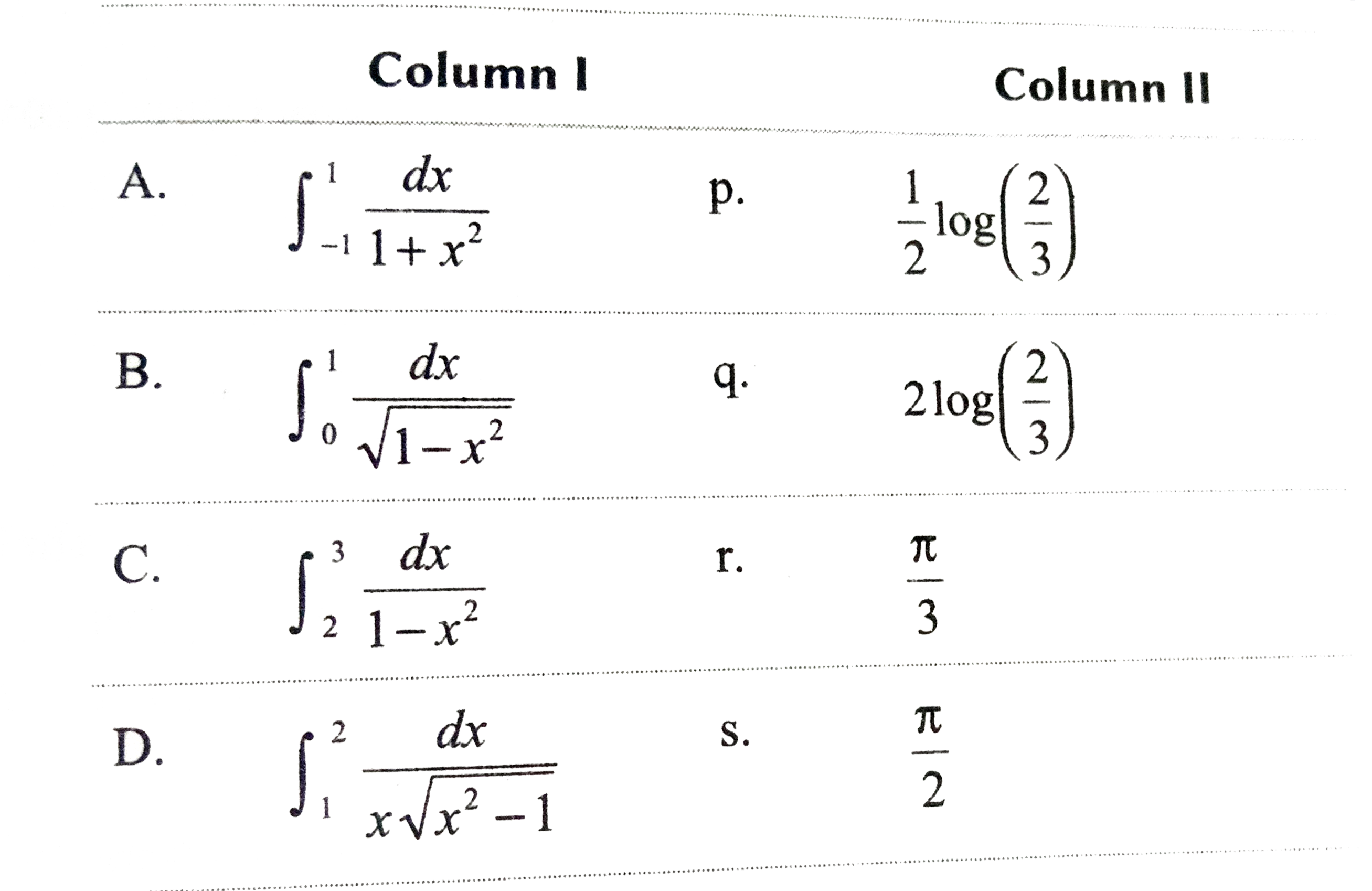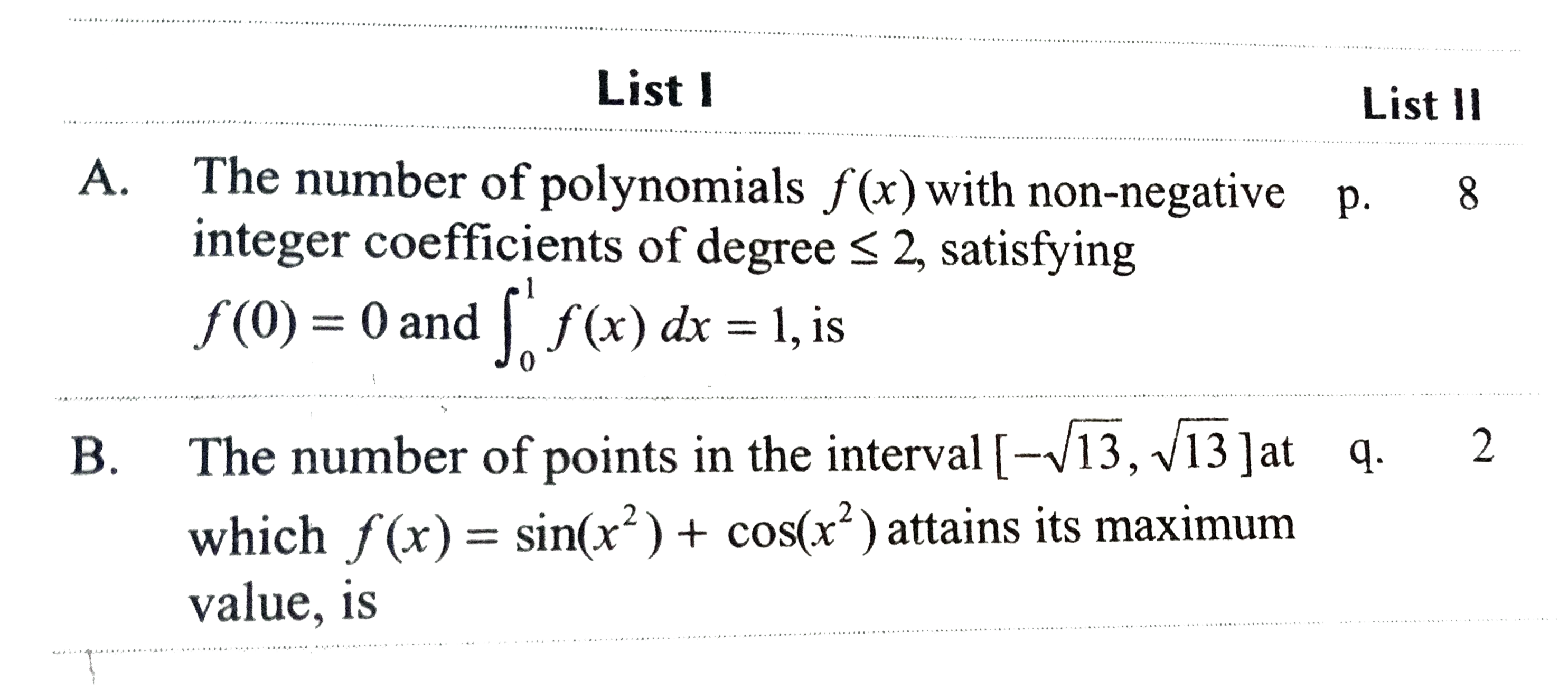Complete Solutions to Exercise (Questions Asked In Previous 13 Years Exam) of chapter DEFINITE INTEGRAL of Class 12 book with complete answers and questions
| Class 12 | MATHS |
| Chapter | DEFINITE INTEGRAL |
| ARIHANT MATHS | Exercise (Questions Asked In Previous 13 Years Exam) |
| Number Of Questions | 38 |
| Academic Year | 2023-24 |
The value of `int_(-pi//2)^(pi//2) (x^(2)cos x )/(1+e^(x)) dx` is equal to
05:07View SolutionThe total number for distinct `x epsilon[0,1]` for which `int_(0)^(x)(t^(2))/(1+t^(4))dt=2x-1` is __________.
03:45View SolutionLet `f(x)=7 tan^(8) x +7 tan^(6) x-3 tan^(4) x-3 tan^(2)x ` for all `x in(-(pi)/(2),(pi)/(2))`. Then the correct expression (s) is are
04:25View SolutionLet `f prime(x)=(192x^3)/(2+sin^4 pix)` for all `x in RR` with `f(1/2)=0.` If `mlt=int_(1/2)^1f(x)dxlt=M` then the possible values of m and M are (i) `m=13,M= 24` (ii)` m=1/4,M=1/2` (iii) `m=-11,M = 0` (iv) `m=1,M=12`
05:56View SolutionThe option(s) with the values of `aa n dL` that satisfy the following equation is (are) `(int0 4pie^t(s in^6a t+cos^4a t)dt)/(int0pie^t(s in^6a t+cos^4a t)dt)=L` `a=2,L=(e^(4pi)-1)/(e^(pi)-1)` (b) `a=2,L=(e^(4pi)+1)/(e^(pi)+1)` `a=4,L=(e^(4pi)-1)/(e^(pi)-1)` (d) `a=4,L=(e^(4pi)+1)/(e^(pi)+1)`
05:29View SolutionLet `F:R- R` be a thrice differentiable function. Suppose that `F(1)=0,F(3)=-4` and `F(x)<0` for all `x in (1/2,3)`. Let `f(x)=xF(x)` for all `x in R` The correct statement is
03:43View SolutionLet F : R `to` R be a thrice differentiable function . Suppose that `F(1)=0,F(3)=-4 and F(x) lt 0 " for all" x in (1,3).` f(x) = x F(x) for all `x inR`.
`Ifint_(1)^(3)x^(2)F'(x)dx=-12 andint_(1)^(3)x^(3)F'' (x)dx =40`, then the correct expression (s) is //are09:43View SolutionLet `f: RvecR` be a function defined by `f(x)={[x],xlt=2 0,x >2` where `[x]` is the greatest integer less than or equal to `xdot` If `I=int_(-1)^2(xf(x^2))/(2+f(x+1))dx ,t h e nt h ev a l u eof(4I-1)i s`
08:23View SolutionIf `alpha=int_0^1(e^9x+3tan^((-1)x))((12+9x^2)/(1+x^2))dxw h e r etan^(-1)` takes only principal values, then the value of `((log)_e|1+alpha|-(3pi)/4)i s`
02:44View SolutionThe integral `overset(pi//2)underset(pi//4)int (2 cosecx)^(17)dx` is equal to
09:04View SolutionLet `f:[0,2]vecR` be a function which is continuous on [0,2] and is differentiable on (0,2) with `f(0)=1` `L e t :F(x)=int_0^(x^2)f(sqrt(t))dtforx in [0,2]dotIfF^(prime)(x)=f^(prime)(x)` . for all `x in (0,2),` then `F(2)` equals `e^2-1` (b) `e^4-1` `e-1` (d) `e^4`
03:27View SolutionMatch the conditions/ expressions in Column I with statement in Column II
 17:51View Solution
17:51View SolutionMatch List I with List II and select the correct answer using codes given below the lists
 05:36View Solution
05:36View SolutionThe value of `int_0^1 4x^3{(d^2)/(dx^2)(1-x^2)^5}dxi s`
03:42View SolutionThe value of the integral `int_(-pi//2)^(pi//2) (x^(2) + log" (pi-x)/(pi+x)) cos x dx `
05:47View SolutionThe value of `int_(sqrt(ln2))^(sqrt(ln3)) (xsinx^2)/(sinx^2+sin(ln6-x^2)) dx` is
07:10View SolutionLet `f:[1,oo]` be a differentiable function such that `f(1)=2.` If `int_1^xf(t)dt=3xf(x)-x^3` for all `xgeq1,` then the value of `f(2)` is
03:30View SolutionThe value of `int_(0)^(1) (x^(4)(1-x)^(4))/(1+x^(2)) dx` is (are)
03:45View SolutionFor `a in R` ( the set of all real number) , `a ne -1`,
`lim_(n to oo)((1^(a)+2^(a)+....+n^(a)))/((n+1)^(a-1)[(na+1)+(na+2)+...+(na+n)])=(1)/(60)` Then, a is equal to11:10View SolutionConsider the statements : P : There exists some x IR such that f(x) + 2x = 2(1+x2) Q : There exists some x IR such that 2f(x) +1 = 2x(1+x) Then (A) both P and Q are true (B) P is true and Q is false (C) P is false and Q is true (D) both P and Q are false.
08:58View SolutionWhich of the following is true?
08:06View SolutionFor any real number `x ,l e t[x]` denote the largest integer less than or equal to `x ,L e tf` be a real-valued function defined on the interval `[-10 , 10]` be `f(x)={x-[x],if[x]i sod d1+[x]-x ,if[x]i se v e n` Then the value of `(pi^2)/(10)int_(-1)^(10)f(x)cospixdxi s____`
09:32View SolutionLet f be a non-negative function defined on the interval .[0,1].If `int_0^x sqrt[1-(f'(t))^2].dt`=`int_0^x f(t).dt`, `0<=x<=1` and f(0)=0,then
05:07View SolutionIf `I_n=int_(-pi)^(pi) \ (sinnx)/((1+pi^x) \ sinx) \ dx, n=0,1,2,......` then which one of the following is not true ?
12:36View SolutionLet `S_n=sum_(k=0)^n n/(n^2+k n+k^2) and T_n=sum_(k=0)^(n-1)n/(n^2+k n+k^2)`,for `n=1,2,3,.......,` then
06:33View SolutionThe Integral `int_(pi/4)^((3pi)/4)(dx)/(1+cosx)` is equal to: (2) (3) (4)
05:08View SolutionLet `I_n=int tan^n x dx, (n>1)`. If `I_4+I_6=a tan^5 x + bx^5 + C`, Where `C` is a constant of integration, then the ordered pair `(a,b)` is equal to :
02:57View Solution` lim_(n rarr infty ) [((n+1)(n+2)...3n)/(n^(2n))]^(1//n)` is equal to
06:54View SolutionThe integral `int_2^4(logx^2)/(logx^2+log(36-12 x+x^2)dx` is equal to: (1) 2 (2) 4 (3) 1 (4) 6
03:01View SolutionThe integral ` int_(0)^(pi) sqrt(1+4 sin )(x)/(2) -4 "sin" (x)/(2) dx` is equal to
07:47View SolutionStatement I The value of the integral `int_(pi//6)^(pi//3) (dx)/(1+sqrt(tan x)) is pi/6` Statement II `int_(a)^(b) f(x) dx = int_(a)^(b) f(a+b-x)dx`
02:46View SolutionThe intercepts on x-axis made by tangents to the curve, `y=int_0^x|t|dt , x in R ,` which are parallel to the line `y""=""2x` , are equal to (1) `+-2` (2) `+-3` (3) `+-4` (4) `+-1`
05:02View Solution`Ifg(x)= int_(0)^(x) cos ^(4)t dt, "then " g (x+pi)` equals
05:42View SolutionThe value of `int_(0)^(1) (8 log(1+x))/(1+x^(2)) dx` is
04:23View SolutionFor `x epsilon(0,(5pi)/2)`, definite `f(x)=int_(0)^(x)sqrt(t) sin t dt`. Then `f` has
02:23View SolutionLet `p(x)` be a function defined on R such that `lim_(xrarr infty) f (3x)/(f(x))=1,p'(x)=p'(1-x),"for all" x in [0,1],p(0)=1 and p(1)=41."Then" , int_(0)^(1)p(x) dx` equals
03:11View Solution`int_(0)^(pi)[cos x] dx, [ ]` denotes the greatest integer function , is equal to
03:46View SolutionLet `I=int_(0)^(1)(sinx)/(sqrtx) dx and f= int_(0)^(1)( cos x)/(sqrtx) dx`
Then , which one of the following is true ?01:52View Solution
Exercise (Questions Asked In Previous 13 Years Exam) questions and complete solutions for chapter DEFINITE INTEGRAL of ARIHANT MATHS (HINGLISH) of Class 12
All Exercises from ARIHANT MATHS Class 12 MATHS DEFINITE INTEGRAL
- Example
- Exercise (Matching Type Questions)
- Exercise (More Than One Correct Option Type Questions)
- Exercise (Passage Based Questions)
- Exercise (Questions Asked In Previous 13 Years Exam)
- Exercise (Single Integer Answer Type Questions)
- Exercise (Single Option Correct Type Questions)
- Exercise For Session 1
- Exercise For Session 2
- Exercise For Session 3
- Exercise For Session 4
- Exercise For Session 5
- Exercise For Session 6
